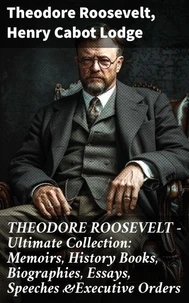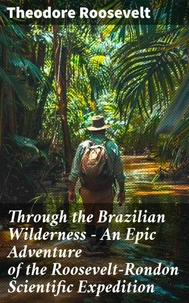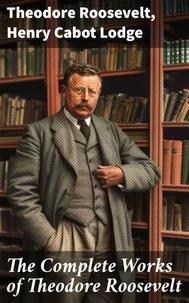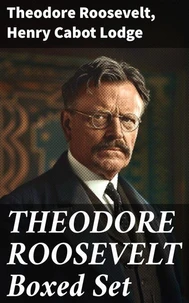The Winning of the American West (Complete Four - Volume Edition)
Par :Formats :
Disponible dans votre compte client Decitre ou Furet du Nord dès validation de votre commande. Le format ePub est :
- Compatible avec une lecture sur My Vivlio (smartphone, tablette, ordinateur)
- Compatible avec une lecture sur liseuses Vivlio
- Pour les liseuses autres que Vivlio, vous devez utiliser le logiciel Adobe Digital Edition. Non compatible avec la lecture sur les liseuses Kindle, Remarkable et Sony
 , qui est-ce ?
, qui est-ce ?Notre partenaire de plateforme de lecture numérique où vous retrouverez l'ensemble de vos ebooks gratuitement
Pour en savoir plus sur nos ebooks, consultez notre aide en ligne ici
- Nombre de pages983
- FormatePub
- ISBN859-65--4738553-0
- EAN8596547385530
- Date de parution13/11/2022
- Protection num.Digital Watermarking
- Taille1 Mo
- Infos supplémentairesepub
- ÉditeurDIGICAT
Résumé
In "The Winning of the American West, " Theodore Roosevelt offers a compelling four-volume narrative that chronicles the westward expansion of the United States. Through a blend of vivid storytelling and meticulous historical research, Roosevelt explores the various social, political, and economic factors that shaped this tumultuous period. His literary style captures the spirit of adventure and discovery, while his passionate prose reflects a profound understanding of the complexities inherent in American history.
As a product of the late 19th century, the work contextualizes the rugged individualism associated with American identity and examines the tensions that arose between settlers and Indigenous peoples. Theodore Roosevelt, the 26th President of the United States, was an avid historian and naturalist whose interests in frontier life and American exceptionalism deeply influenced his scholarship. His own experiences in the West, particularly as a rancher in North Dakota, and his conviction that the West represented the epitome of American virtue led him to write this extensive study.
Through his presidency and scholarship, he championed the conservation of natural resources, which reflects the grandeur and fragility of the landscapes he revered. This authoritative work is essential for anyone interested in American history or the dynamics of frontier life. Roosevelt's insights provide a riveting exploration of the nation's formative years, making it invaluable for scholars, students, and casual readers alike who wish to understand the intricate tapestry of America's past.
As a product of the late 19th century, the work contextualizes the rugged individualism associated with American identity and examines the tensions that arose between settlers and Indigenous peoples. Theodore Roosevelt, the 26th President of the United States, was an avid historian and naturalist whose interests in frontier life and American exceptionalism deeply influenced his scholarship. His own experiences in the West, particularly as a rancher in North Dakota, and his conviction that the West represented the epitome of American virtue led him to write this extensive study.
Through his presidency and scholarship, he championed the conservation of natural resources, which reflects the grandeur and fragility of the landscapes he revered. This authoritative work is essential for anyone interested in American history or the dynamics of frontier life. Roosevelt's insights provide a riveting exploration of the nation's formative years, making it invaluable for scholars, students, and casual readers alike who wish to understand the intricate tapestry of America's past.
In "The Winning of the American West, " Theodore Roosevelt offers a compelling four-volume narrative that chronicles the westward expansion of the United States. Through a blend of vivid storytelling and meticulous historical research, Roosevelt explores the various social, political, and economic factors that shaped this tumultuous period. His literary style captures the spirit of adventure and discovery, while his passionate prose reflects a profound understanding of the complexities inherent in American history.
As a product of the late 19th century, the work contextualizes the rugged individualism associated with American identity and examines the tensions that arose between settlers and Indigenous peoples. Theodore Roosevelt, the 26th President of the United States, was an avid historian and naturalist whose interests in frontier life and American exceptionalism deeply influenced his scholarship. His own experiences in the West, particularly as a rancher in North Dakota, and his conviction that the West represented the epitome of American virtue led him to write this extensive study.
Through his presidency and scholarship, he championed the conservation of natural resources, which reflects the grandeur and fragility of the landscapes he revered. This authoritative work is essential for anyone interested in American history or the dynamics of frontier life. Roosevelt's insights provide a riveting exploration of the nation's formative years, making it invaluable for scholars, students, and casual readers alike who wish to understand the intricate tapestry of America's past.
As a product of the late 19th century, the work contextualizes the rugged individualism associated with American identity and examines the tensions that arose between settlers and Indigenous peoples. Theodore Roosevelt, the 26th President of the United States, was an avid historian and naturalist whose interests in frontier life and American exceptionalism deeply influenced his scholarship. His own experiences in the West, particularly as a rancher in North Dakota, and his conviction that the West represented the epitome of American virtue led him to write this extensive study.
Through his presidency and scholarship, he championed the conservation of natural resources, which reflects the grandeur and fragility of the landscapes he revered. This authoritative work is essential for anyone interested in American history or the dynamics of frontier life. Roosevelt's insights provide a riveting exploration of the nation's formative years, making it invaluable for scholars, students, and casual readers alike who wish to understand the intricate tapestry of America's past.







